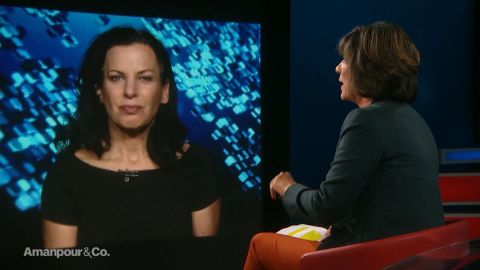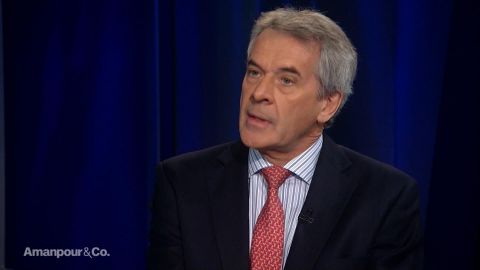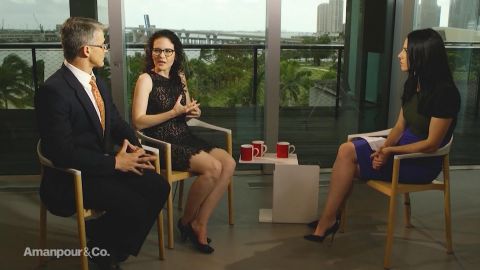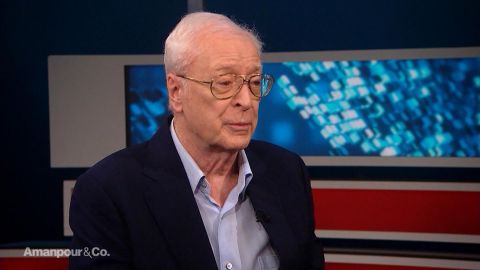Read Transcript EXPAND
ALICIA MENENDEZ: Thank you both so much for sitting down with us.
PATRICIA MAZZEI: Miami Bureau Chief, “New York Times”: Thanks for having us.
MENENDEZ: What is the biggest political story happening in Florida that you’re not hearing enough about?
MAZZEI: I think would you think the Senate race is the biggest story because the Senate hangs in the balance in Washington and we have a competitive race here. But the governors’ race is really the one that has gotten the most attention.
MARC CAPUTO, REPORTER, “POLITICO”: Right. We’re seeing, for the first time ever, the Florida Democratic party or any major political party has nominated an African-American to be its nominee for governor. You know, despite Florida’s multiethnic, multiracial culture, we haven’t seen that before. And so, you have a true, true blue progressive, kind of a Bernie Sanders mold with a little bit of Hillary Clinton and some Barack Obama in Andrew Gillum and then he’s against a very Trump-y, pro Trump Republican in Ron DeSantis. What’s interesting about this race is some people ask, well, where’s the middle? Well, there’s kind of no middle here. There’s an old joke that says, what’s in the middle of the road? Road kill. And in this race, that’s probably what we’re going to see. It’s not that we’re a red state or a blue state, we might be a schizophrenic state.
MENENDEZ: And that’s representative of the rest of the country right now, if feels like.
CAPUTO: That’s the point. Yes. And in addition to that, we actually might see Andrew Gillum, if the polling is right, the very progressive guy, get elected governor. And then, very conservative Republican governor we currently have, Rick Scott, being elected to the United States Senate. So, we’re looking at kind of a split decision here if the polling is right. But we just, in the end, don’t know.
MENENDEZ: When you look at the Senate race, why is an incumbent Democrat like Bill Nelson having so much trouble?
CAPUTO: Well, because he’s in part running in a purple state. This is not a blue state. It’s not a red state. Although, really, if you look at for the midterms, this is the time when Republicans excel. Also, Bill Nelson is against Rick Scott. This guy is richer than (INAUDIBLE). He so far spent $40 million of his own money in the race, and we’re looking at tens of millions more than Rick Scott might spend. Florida’s is not one state, it’s 10 states, that’s 10 media markets. In order to campaign here, you don’t go to diners, you advertise on television. That cost a lot of money, as much as $3 million a week. So, that’s a big part of the equation. We also have a lot of White retirees who tend not only to move to Florida and want to vote but they vote Republican and they vote Republican often.
MENENDEZ: With the influx the Puerto Ricans that have come into the state following Hurricane Maria, are they poised to actually make a difference in this election?
MAZZEI: I am skeptical. Not because Puerto Ricans don’t want to be a political force but because the ones who have arrived since Maria, in many cases, are still trying to settle in and have bigger priorities than voting. And they come from an island where there are no midterm election. So, they don’t have the culture of voting every two years, they vote every four years.
MENENDEZ: But they have a heavy culture of voting during those four years.
MAZZEI: They do. But Trump is not on the ballot. We’re just talking about candidates who are Trump-ian, but it’s not the same as having Trump at the ballot. So, if they’re upset at the president for the hurricane response, it’s not like a direct link. And in general, the Puerto Ricans who have been here before Maria had tended not to vote as much as they could. They’ve underperformed in elections. And think until we see that change, it’s going to be hard to say, “Oh, my God, they’re going to be a huge force.”
CAPUTO: Governor Rick Scott has done a fabulous job of telling Puerto Rican voters that he cares. And if we saw, at least, in the early polling, he’s been successful in doing that. What we don’t know is not only what these new voters from Puerto Rico are going to do, but the older ones who are here, they’re now being paid attention to. They’re now being told, “Look, you matter. Show up and vote.” And I think we might start seeing a change in their turn-out patterns, which we haven’t seen before. As far as the Hispanic community in Florida, it’s not one Hispanic community, it’s a bunch. But the bulk is Cuban- Americans. Cuban-Americans have a fantastic voting right. And slowly you’re starting to see the Cuban-American Republicans in South Florida starting to be counterbalanced by the Puerto Rican voters who are Democratic-leaning in Central Florida. We don’t know how it’s going to mix out.
MAZZEI: And what Governor Scott has done well that I think other Republicans have tried to do here as well, which maybe people haven’t seen in the rest of the country might be surprised by, is that he has campaigned to each nationality differently as opposed to treating Latinos like one homogenous group that you just speak to them in in Spanish. He goes to Colombian Independence Day event and he goes to a Puerto Rican round table, where the focus is not just Latinos in general, “But, oh, we’re going to talk about your specific issue.” And people really respond well to that because they don’t feel like they’re just lumped in as part of a big group but like somebody is actually — even if they can’t do much. Because, you know, the governor of Florida doesn’t set foreign policy, they can at least listen to them and they feel heard.
MENENDEZ: So, understanding that younger Cuban-Americans are trending more progressive than their older forbearers, do Cubans still set a firewall for Republicans in South Florida?
MAZZEI: I would say that one of the surprises we’ve seen from 2016 to now is there were a lot of skeptical Cubans towards Trump because they had to come off of this fractious Republican primary where Trump defeated Jeb Bush and Marco Rubio who were like the local favorite sons. Especially Rubio, who is Cuban-American. And so, there were some Cubans who maybe didn’t vote for president or voted Democrat or just didn’t know what to do. Wrote in Jeb Bush, you know. But now, they’re sort of — they’ve consolidated in many cases behind Trump because the Republican party of Florida has become the Republican party of Trump. And so, they are much more comfortable saying that they’re going to support him and I think you’re going to see that in some Congressional races where local Republicans in Miami, especially, have more Cuban support than they might have had in 2016.
CAPUTO: And I think the only politician from the Democratic side of the aisle that kind of cracked the Cuban puzzle was President Obama. He was able to get those younger voters out. And I think that was more of a function of him being kind of a transformational figure. And therefore, younger voters, regardless of ethnicity or race, came out, voted for him. Maybe Andrew Gillum will have that effect. I’m not sure. One of the things about Andrew Gillum’s candidacy in the governor’s race is that he doesn’t seem to have had enough money and enough time to message as deeply as you would and as deeply as you can in a presidential race. So, we might be looking at a lower turnout race here. And because it’s a midterm, using midterm races in Florida have a lower turnout than a presidential race.
MENENDEZ: So, when you look at Gillum and DeSantis and they’re not necessarily bringing moderates to the table, who are they appealing to? What is the appeal of each candidate?
MAZZEI: Gillum is appealing, in some cases, to people who don’t usually vote in midterms. We saw in the primary that he brought out some young voters, some non-White voters that were unusual to see on the voting roles, we’ll see if he continues that for the general. And his — and I think his key appeal to a lot of these folks is that he’s very likable. I mean, he has the charisma that is sort of difficult to teach and to learn as a politician. And DeSantis is bringing out people who voted for Trump and who are solid conservative Republicans and want to see the state remain red. And Florida usually votes red in midterms, which I think is hard for people to realize because we’re such a purple swing state, the largest swing state in the country in presidential years. It doesn’t usually act that way in midterm.
CAPUTO: DeSantis’ message is just two things, it’s, “I’m going to stay the course and Andrew Gillum is a corrupt copier.” And this is essentially his message that he’s —
MAZZEI: That’s he’s a radical.
CAPUTO: Right. That you saw in his first debate. And, you know, you can’t trust Andrew Gillum. You’re seeing some of the similar messaging used against Barack Obama that’s being used against Andrew Gillum. It’s one of those things that leads some Democrats, especially African-American Democrats to think it is kind of a race-based attack. And in fact, one of the things that characterized the peculiarity of the governor’s race at the very beginning of the general election, was the day after Ron DeSantis, when interviewed on “Fox,” had said that he didn’t want voters to monkey this up when it came to this election. And a lot of Democrats and a lot of African-Americans perceived that as a racial slur against Andrew Gillum who again is the first African-American nominee for governor in the Florida Democratic party or any major Democratic party. And for about a month, we had a lot of racial tension. One of the things that you saw from the 2016 presidential race, which we didn’t really see in Florida before, is how racial messaging can actually work for Republicans. You saw that with President Trump. And there was a strong white turnout for him that we hadn’t really seen before. And there’s a school of thought among Conservatives in Florida, that look if Andrew Gillum wants to talk about race and Andrew Gillum wants to make this a referendum about race and accuse Ron DeSantis of race-baiting which he essentially did during the first debate, that’s actually going to turn out more white voters. And that’s an element we have very little experience in kind of gauging and we’re going to have to wait until election day to see if it’s effective.
MENENDEZ: You said that traditionally Florida votes red during a midterm election. Midterm elections at the same time are generally seen to be a referendum on this president. How do those two dynamics comport in this election?
MAZZEI: I think this is a weird midterm because it’s an unusual president, in that he has inspired a lot of the left to become more active in politics. And so that is what Democrats are banking on, which is that there will be people who are just going to vote for Democrats because there’s a D next to their name and not an R and the president is a Republican. More than in other midterm election which is sort of the emotions toward Trump are just very raw. But, you know, the election were happening right in the middle of the immigration crisis, right where there was a lot of controversy over kids being separated from their parents. I think it would have been easier to say, oh, that’s going to drive a bunch of people out because that was an issue that sort of pierced and cut through and everybody knew about it and was talking about. Do some of the other controversies that sort of take over Washington get trickled down to the average voter? I’m not sure. So that’s why, it’s sort of like we’ll see if they’ll be able to actually tap into some of that, you know —
MENENDEZ: Then stepping away —
MAZZEI: — progressive resistance and get them to vote.
MENENDEZ: Stepping away then from the national environment when you are talking to Floridians, what are the issues in this state that are motivating them to vote?
MAZZEI: Not some of the same issues that get talked about nationally. I mean in Florida the environment is a big issue. We had a summer where water quality was a real problem. You had toxic algae.
MENENDEZ: Red tide.
MAZZEI: Red tide in the Gulf of Mexico that was killing a lot of fish and mammals, dead sea turtles by the hundreds and the thousands coming up on the beaches. And then you had blue-green algae coming down from Lake Okeechobee and causing respiratory problems —
CAPUTO: It was disgusting stuff.
MAZZEI: — that it looks like pea soup. I mean — and so this is happening on both ends of the state, in a state where already climate change is a big issue because you see tidal flooding and sea level rise threatening builders and affecting people’s insurance rates. So all of those issues together, matter a lot more here and it matter to a lot of voters, much more than they would elsewhere in the country.
CAPUTO: We look at the polling they say health care is a big issue. Florida is a state that has an expanded Medicaid under Obamacare, 800,000 people lack health insurance that they otherwise would have gotten and Democrats have made a good, concerted effort to make that a big deal. It does appear that when you put everything together, the environmental catastrophe of red tide, blue-green algae, there is even a brown tide, dead whale shark on the beaches, dead dolphin. President Trump’s relative lack of popularity in the state and then the issue of health care, it starts to look like a very bad toxic soup for Republicans. Yet to their credit, they’re still holding on and that’s why we’re kind of hesitant to say oh, Rick Scott is going to win or lose.
MAZZEI: And they’re going to spend so much money between now and election day in these expensive TV markets that it’s going to be on slot.
MENENDEZ: I want to turn to an issue that I haven’t heard either of you speak about, which is the shooting in Parkland. A lot of enthusiasm and energy especially from young voters in Florida. At the time that it happened, has that enthusiasm held?
CAPUTO: That’s a good question. I mean the fact that we didn’t mention it and the fact that it was so politically significant kind of reflects the broader attention span, perhaps not just the political class, but also of voters in general. What Parkland did change this election season, was a perception of guns. For the first time, it became politically safe and perhaps even politically necessary for Democrats to embrace gun control full on.
MAZZEI: The fact that candidates are even talking about gun control [13:35:00] and not just Democrats. But in the first debate for governor, you did not see Ron DeSantis give a huge pushback on the gun issue, which normally would have been like catnip for a Republican to go after. So they have changed the tenor of the debate and the fact that it’s even coming up in debates and in ads, because we are seeing the gun ads come out. We’re seeing some of the Parkland parents not in favor of gun control but who want to focus on school safety cut ads for Republicans. So it’s a complicated issue. The fact that it’s being discussed or being called about or asked about in a debate I think is a change and we would not have predicted in January.
CAPUTO: They also effectuated change at the state level. The Parkland shooting happened right in the midst of the Florida legislative session. But the idea, if you would have told me a year ago — heck, if you would have told me on February 13, the day before the massacre, that Republican-led legislature and Republican Governor Rick Scott would have supported gun control that would have raised the age limit for purchasing semiautomatic or just long guns, that they would have put in what is known as a red flag law allowing police essentially to seize your guns if they think you are, mentally unstable, I would have laughed you off the street. And those things not only were brought up, they passed in record time.
MENENDEZ: So looking forward to 2020. How much will the results of this midterm impact how each party thinks about their approach to the next presidential election?
CAPUTO: If the Democrats lose both the governor’s race and the Senate race, you’re going to see a party in shambles. Because they were already needing, to put it mildly therapy, after Hillary Clinton lost Florida. They didn’t think they would. And they had previously lost in the midterm in 2014. If you — if the Democratic party winds up losing three general elections in a row in Florida, we’re going to stop looking at Florida as a swing state, this is going to start looking like a red state. If the Republicans lose, they’re going to blame their candidates. In the end, Governor Rick Scott, while tremendously wealthy, and while he does have a good record of campaign on, is an awkward campaigner. And he’s still going against an incumbent in Senator Bill Nelson. And the gubernatorial race, to Patty’s point earlier, Andrew Gillum is very likable and charismatic candidate. Those words are not used to describe the Republican nominee, Ron DeSantis. There are a lot of Republicans who know him from Congress, from the Foreign Delegation who don’t really like him. So he’s not kind of a warm and fluffy guy.
MAZZEI: And in the governor’s race, if it plays out where Gillum does win, I think Democrats are going to have an argument nationally to make for progressive candidates because that has always been the test case for him. Democrats here have usually put up a very centrist candidate for governor. Last time, it was a former Republican. And here they’re going all the way in on the progressive message. And if the progressive message bests the Trump acolyte message that is going to be able to hold them parallel to 2020, to well, how do you run against Trump? This is one way to do it.
MENENDEZ: Thank you both so much.
MAZZEI: Thank you.
CAPUTO: Thanks.
About This Episode EXPAND
Christiane Amanpour speaks with Peter Westmacott, former UK Ambassador to Turkey and the U.S., about relations with Saudi Arabia and Juliette Kayyem, former Asst. Secy. of Homeland Security, about domestic terrorism. Alicia Menendez speaks with Patricia Mazzei of The New York Times and Politico reporter Marc Caputo about the midterms. Christiane Amanpour speaks with legendary actor Michael Caine.
LEARN MORE



